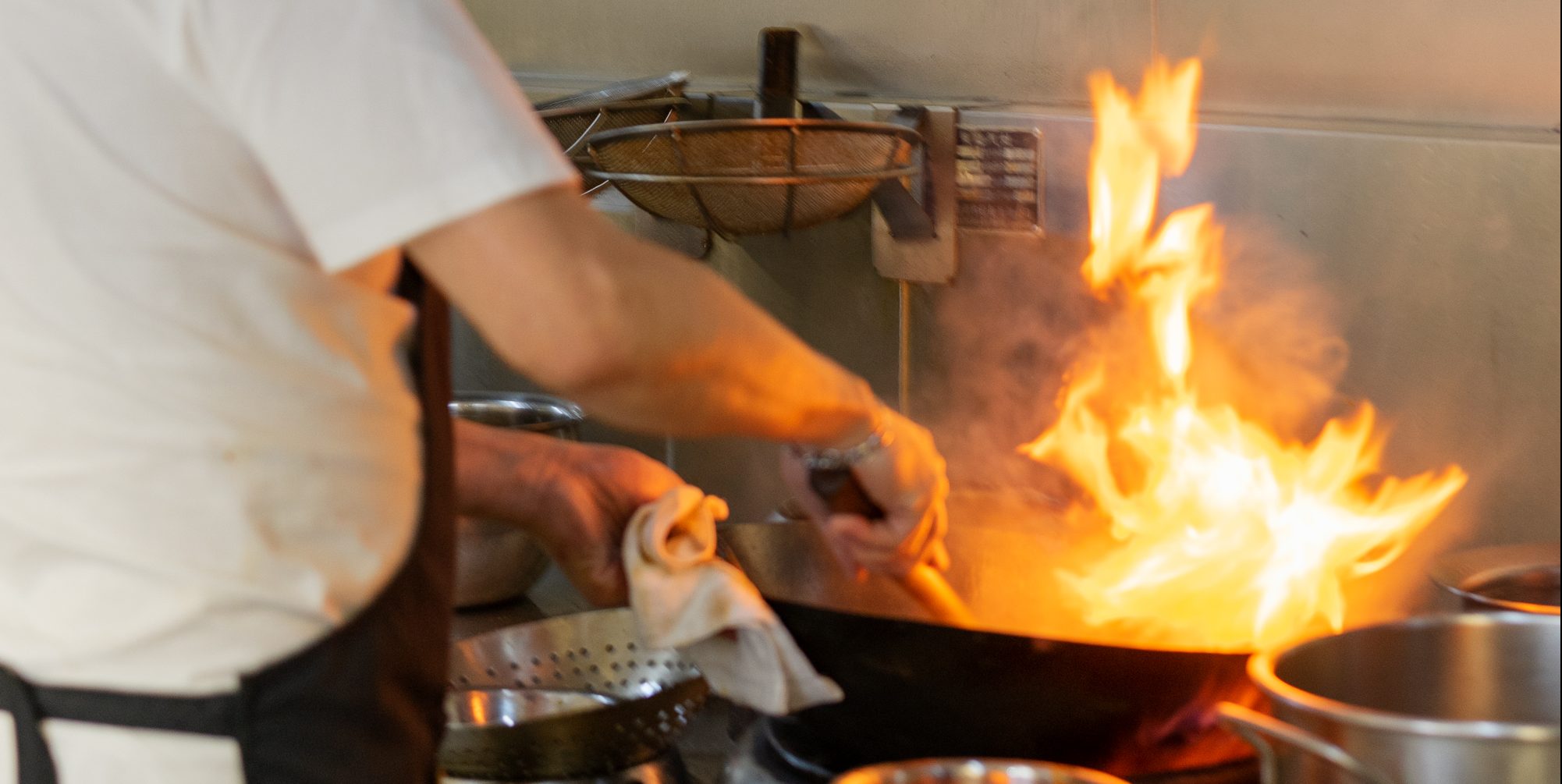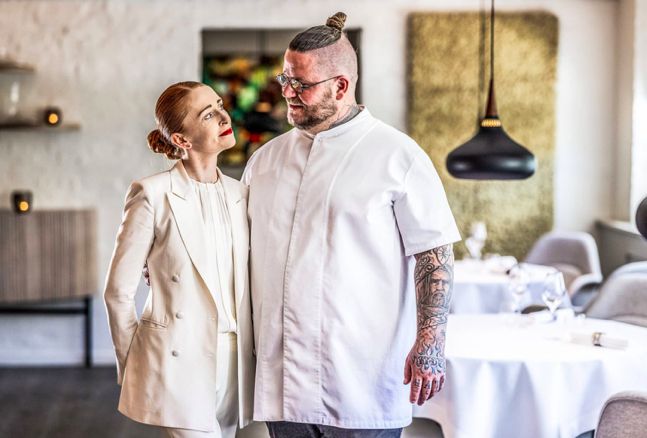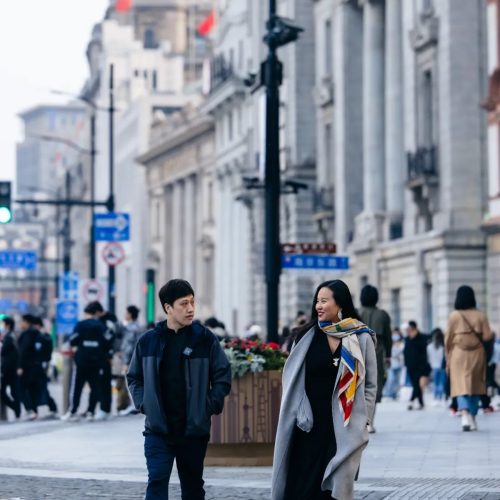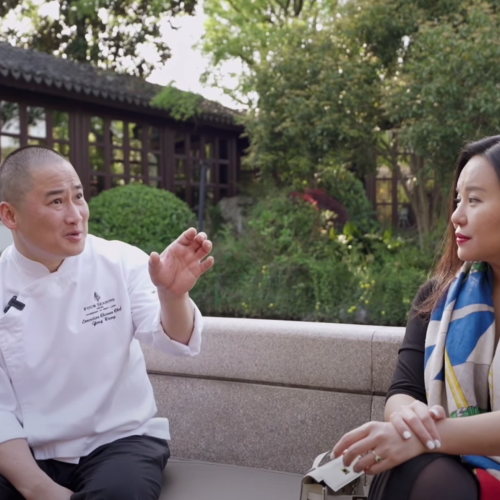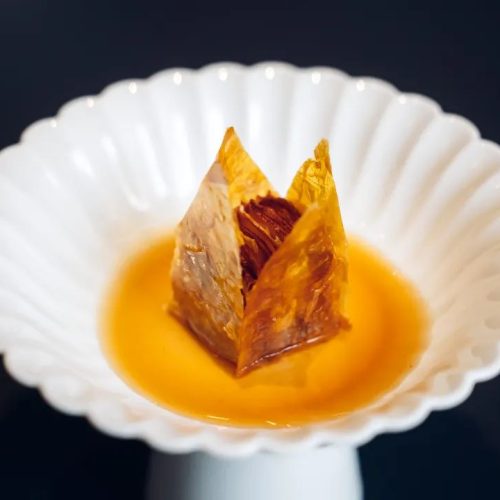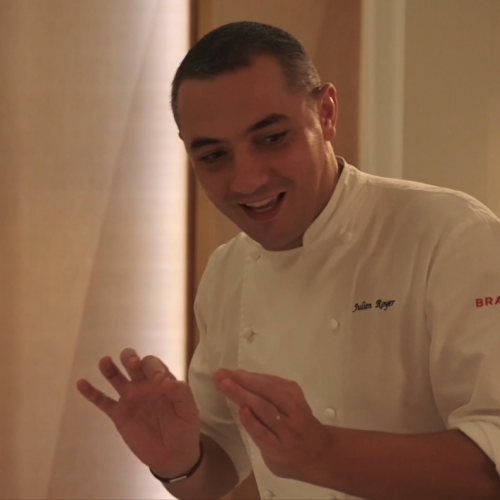There was a time in China, when people take time to sip on a cup of brewed tea and really appreciate the food in their plate. A kind of meditation that helps you enojoy this way of life ; as if it clears all the daily troubles. A dish does more than just feeding someone; it is a collection of societal interactions, artistic presentations and gustatory pleasures. Sichuan cuisine deserves due respect. The founder of Nan Xing Yuan, Deng Huadong, has brought traditional “Nan Tang” dishes to Shanghai, bringing back to life the intricate hospitality and refined subtlety of Chinese fine dining.
It is hard not to like Sichuan cuisine, which has evolved over time to offer rich flavours and elegant production. Most Sichuan restaurants in Shanghai are packed with diners, but the food they serve are considered Jianghu cuisine (Jianghu literally means large rivers and lakes, here it refers to dishes rooted in folk culture). They interpret Sichuan cuisine as thetypical numbing, spicy fanfare, ignoring what’s supposed to be true Sichuan cuisine. In addition to the 24 flavour types, Sichuan cuisine enjoys its fame for multifarious flavours patterns, with the spiciness being a part but definitely not everything. Dining at Nan Xing Yuan is like humming an old tune; it resonates within. I say so because it handles traditional dishes with excellent taste, even the chili oil is teemed with layers of fragrance.
Among the top Sichuan restaurants in Shanghai, Yuzhilan focuses on literati cuisine that fuses tradition with modern trends, while Nan Xing Yuan is a complete renaissance of the old focusing on heat control and knife skills. Diners in Shanghai are lucky to have both, I’d say. I heard about Deng G a few years ago and wanted to have a try, but found out it’s closed down and moved to Hong Kong, so I could only recommend it to my friends in Hong Kong. After some twists and turns, we finally saw the opening of Nan Xing Yuan, which has brought us an elegant breeze of “Nan Tang” flair.



Nan Tang – A generic term for fine restaurants in Sichuan during the Republican period
Nan Tang refers to a food culture that emerged in the late Qing and early Ming dynasties when wealthy merchants from Jiangsu and Zhejiang provinces went to Sichuan to do silk business, bringing their hometown dishes and combining them with local official cuisine. There were many immigrants in Sichuan at the time, creating a unique food culture that mixed northern and southern traditions. As those Jiangsu merchants were from the south, these restaurants came to be known locally as Nan Tang (literally “southern hall”). Nan Tang restaurants pay special attention to dining rituals and processes because people came here to enjoy more than just food, it later became a generic term for fine restaurants.
Listening to chef Deng talking about Nan Tang culture was an enchanting experience for me. He said everything about banqueting was done with guests in mind. If the banquet started at six o’clock, the guests would come to drink tea at five, and they would be served with desserts, four kinds of fresh fruits and four kinds of nuts. Guests would pleasantly feel their appetite increase as they finish the chatting, that’s where formal dishes begin—kind of like cocktail reception in the west.


When the first dish is served, guests will first taste it and then exchange feedback. At this point, the waiter would closely observe guests’ reaction and inform the kitchen about when to serve the second dish and if they should make any adjustment to the flavours. Waiting tables can be stressful, but real good service comes with corresponding salary and tips. The kitchen is even more rigorous. A supervisor would be in charge of the serving order of both cold and hot dishes, ready to improvise like a conductor of the orchestra. To me, the sophistication of hosting private banquet is comparable to serving a table at a three-star Michelin restaurant; it represents a distinct way of knowing food by Chengdu people and how they used to cherish valuable moments with themselves back into those glamorous times.
Settling in Shanghai for nearly 30 years
Embarking on this career was not entirely chef Deng’s own choice, but he knew mastering the skills and techniques was the best way to take back the control over the boat of life. Through years of hard work and living up to every milestone during the journey, he has earned himself due reputation for his craftsmanship.
Attending training courses at Chengdu Catering Company was also a stage for chef Deng. In 1977, he started his professional career by taking a flight to Shenzhen where he stayed for two years enhancing his skills. After that he returned to the Chengdu Catering Company and then was sent to work in a restaurant, and later being sent to the Sichuan Court Restaurant at Hilton Hotel Shanghai. He went to work in Beijing and Indonesia, each for more than a year, when he was invited to open a new restaurant.
Chef Deng had to make a choice: a decent foreign job offer of US$1,300 a month in 1994, or staying in China to open his own restaurant in Shanghai. He chose the latter. He left Chengdu Catering Company three years later. 27 years has elapsed since he co-founded Deng’s Cuisine, followed by his own restaurant Deng G, which he later moved to Hong Kong before returning to Shanghai to open Nan Xing Yuan.
Despite ups and downs, chef Deng has insisted on taking Sichuan cuisine beyond its appearance, emphasizing heat control and seasoning. According to chef Deng, he closed down Deng G Shanghai because he didn’t want Sichuan cuisine to be monotonous. Opening Deng G in Hong Kong was in response to a friend’s invitation, and also because Hong Kong people were receptive to traditional Sichuan flavours, and it was a good chance to give his students some hands-on experience. As a result, Deng G Hong Kong was recommended by the Michelin Plate for three years in a row. If chef Deng hadn’t kept such a low profile, the restaurant would have officially won a star.


Wherever chef Deng goes, he ignites a campaign justifying real traditional Sichuan cuisine. At that time, Hong Kong’s Sichuan restaurants predominantly hailed spicy Jianghu dishes, and it was chef Deng who introduced the local people who love Sichuan cuisine to great variety and nuance of the cuisine.
Even though he never claims his dishes as authentic, chef Deng does approach Sichuan cuisine in a traditional way. His golden rule is combining local ingredients with Sichuan flavours. For example, Xufu Fish Maw uses water-soaked fish maw instead of oil-soaked ones to braise with bean sprouts, minced pork, winter bamboo shoots and bean paste. Xufu is the old name of Yibin in Sichuan, thus the elegant name of the dish. It is now one of the signature dishes of Nan Xing Yuan.
Pan-fried shrimp paste toast is a dish that originally used pork lard as the base in traditional Nan Tang cuisine but was changed to toast in modern times. Chef Deng mentioned that he is not the inventor. During the second World War, there were many foreigners in Sichuan, and booming western restaurants began to sell a kind of pan-fried dumplings using toasts with a filling, from which this dish was conceived.
Of course, if there is a group of people, the nine-coloured lacquer cold dish box brings an unparalleled sense of ceremony. Once the box is opened, the room is immediately wafted with aromatic tang, together with vital, pleasant colours, and imposing banquet dishes. Made by Chengdu lacquer craftsmen, the box itself is a collection of chef Deng’s own for many years, and the phoenix figure on the box is made of copper, which is a craft that is becoming increasingly rare. The nine cold dishes include: marinated mushrooms, pork belly with garlic sauce, fish-fragrant walnuts, beef with dry-aged tangerine rind, okra with ginger syrup, smoked fish with five spices, sunflower chicken with peppercorn, and kidney rolls in chili oil. Guests will be delighted by these stunningly diverse and nuanced amuse-bouche.



Nine-coloured lacquer cold dish box


 Xufu Fish Maw (Up)/Pan-fried shrimp paste toast(Middle)/ Kidney Rolls in Caul Fat(Down)
Xufu Fish Maw (Up)/Pan-fried shrimp paste toast(Middle)/ Kidney Rolls in Caul Fat(Down)
Chef Deng, who had not been at the helm of the wok for many years, returned to Shanghai and reclaimed the spatula for the invitation from an old friend. It all started with a debate on spicy dishes, an issue that seems to have become a right or wrong problem when it comes out of Chengdu people’s table. In 2013, chef Deng cooked in person at a friend’s place and his dishes were hailed as real Sichuan cuisine by a Shanghainese food writer Lao Bo Tou on Weibo. Chef Deng thus became an instant hit among the culinary circle and the following year he decided to continue to cook himself, bringing the long-lost tradition of Sichuan cuisine back to life.
Sichuan cuisine is not inherently narrowed to dauntingly spicy dishes, said chef Deng, and that chili peppers are imported ingredients, just like eating them is an acquired habit. Local people in Chengdu do not actually cook heavily with chili peppers.
Speaking about opening Nan Xing Yuan in Shanghai in 2019, chef Deng said he originally had no intention of expanding, but simply wanted a place to gather with friends after his monthly trip between Hong Kong and Shanghai. Later on, he felt that the room in the old location was not spacious enough to showcase the full meaning of Sichuan cuisine, so he moved the restaurant to an independent house. Various flavour profile of the dishes feeds a tricky palate, but to do Nan Tang dishes chef Deng believes in a sense of space that relates to and echoes with the food. As to whether Nan Tang is a food culture exclusive for the wealthy, chef Deng explained that cultures are not the product of certain group of individuals; even promoting the sense of calmness and noise-free setting for dining would suffice for a strong value of Nan Tang culture.
Nan Xing Yuan is very particular about its production, the ingredients, the rhythm of serving dishes, all for having the right thing at the right time. For example, Sliced Pork Belly with Garlic Sauce is made as a hot dish, giving out rich fragrance of the bright chili oil, and the sweet umami of Sichuan soy sauce. It justifies itself as the most elaborate version I have ever tasted, the level of warmness, the layered flavours, the exact use of seasoning, all gearing towards perfection. I once wanted to reorder the dish but it was sold out already, so to prevent this from happening again, I now place a back-up order for the dish.



Pork belly with garlic sauce (Up)/Bamboo Mushroom and Pork Liver Paste in Supreme Soup(Middle) /Tea Smoked Duck with Chicken Velvet and Cashew(Down)
Nan Xing Yuan is not only a treasure to Shanghai but also to Sichuan cuisine. Many chefs know their skills but chef Deng excels, mastering knives and fire as perfectly as he does. At the age of 64, even though he still enjoys cooking-and he does still cook by himself-he talked about handing over the baton. He also stresses that he will take full responsibility for the dishes as long as the kitchen is under his supervision.
Spiciness is not all there is for Sichuan cuisine. Some people see Sichuan cuisine as intrinsically cheaper food compared to other typical high-end cuisine types, but attaching nobility tags would be unnecessary. The pursuit of deliciousness, ultimate cooking techniques and thought-through presentation… these are the core value of a high-end restaurant, and they outline what you stand for. In my opinion, it would be dull to have only one kind of Sichuan cuisine; it should never become shallow or fattened, and it should stand open to more possibilities – this is perhaps what we call progress.
I have not met chef Deng very often, but I know he is a gentleman with a proud backbone, and he is a respected character for the perseverance and persistence with his dreams. He speaks in a humorous and lively manner, almost like a storyteller, talking about the vivid, glamorous days of Chengdu and well-organized kitchen operations. It may seem over the top, but as many Sichuanese cuisines become increasingly unmoored from their past, it is not easy to see such a high-end standard-bearer for good cooking, and chef Deng is spearheading this renaissance.
27 years of dedication and commitment to making Sichuan dishes in Shanghai, chef Deng’s Nan Xing Yuan deserves a star from the Michelin.

Photograph:Emily Yang



